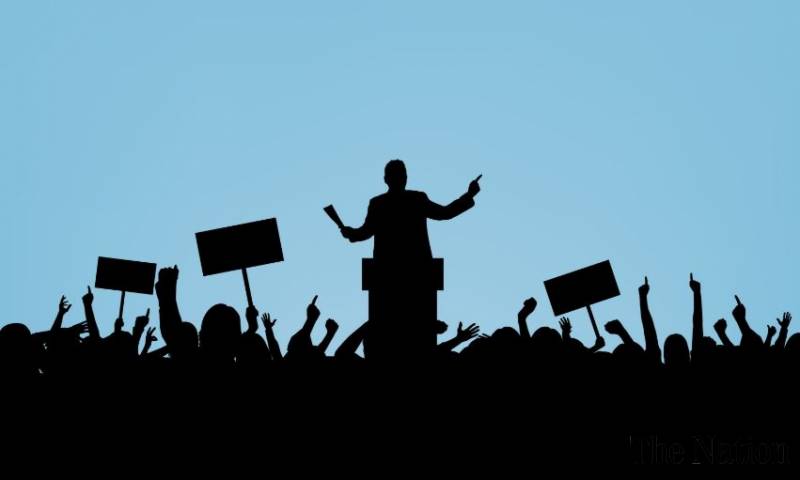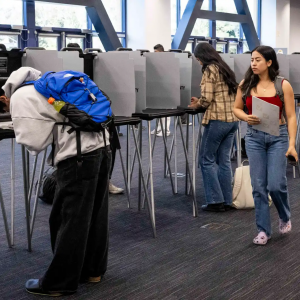It may be a cliche, but the phrase “Trump means it seriously, but not literally” may be quite telling about the power of rhetoric that supports a particular worldview. Narratives, or larger stories about the way the world is, are essential to political candidates. When one thinks of former president Ronald Reagan, we not only think of his policies but also of the world that he saw — one of the United States being a bastion for liberty and freedom around the world. In modern politics, debates highlight these differences, especially when politicians otherwise agree.
The Power of a Worldview
This distinction becomes evident when examining President Donald Trump’s own rhetoric. “58 percent of black youth cannot get a job, cannot work,” Trump said. the Bureau of Labor Statistics clearly disagrees, putting the unemployment rate for black individuals between the ages of 16 and 24 at 11.3-24.8 percent. This can be interpreted as merely a lie, something to rile his base but nothing noteworthy, or as something more powerful. When Trump says things like this, it is because he is confirming a narrative that exists within the minds of his audience — the story that young black Americans are simply not working. “Fifty-eight percent. If you are not going to bring jobs back, it is just going to continue to get worse and worse,” Trump said. The power of his rhetoric, when taken seriously, is not always in the promises that it makes but more specifically in the worldview that it legitimizes.
Trump and Senator Bernie Sanders (I-V) are often compared as both being part of a larger populist trend in politics, or contrasted for their nearly opposite political ideologies, but their real similarity lies in their rhetoric. Each has persuasive power because of the narratives that they support. Both rely on descriptions of the status quo systems of power being “rigged” against the common people to rile up support. Sanders, in his opening remarks at the fifth Democratic presidential debate, took a stand against the “rigged economy,” as he also did in advertisements. In describing campaign finance, he said that the “system is corrupt, big money controls what’s going on.” Alone, these comments all seem par for the course, but when evaluating next to Trump’s they are strikingly familiar. Trump has echoed Sanders in saying that “it’s not just the political system that’s rigged, it’s the whole economy.” Additionally, his distrust in institutions has led him to also call the political structure “a rigged system.” The similarity between the two is clearly not in their views about what should be done to fix these problems. Trump favors conservative economic reform focused on “America first,” while Sanders is a social democrat who supports large government programs to combat economic injustice. Their similarity, and their rhetorical power, is in the narratives that they uphold.
Differences in Narratives
When narratives are in conflict, their importance is amplified. Sanders and Hillary Clinton, for example, share a lot of similarities in economic issues. Both, by the end of the Democratic primary, supported a higher minimum wage, higher taxes, a jobs plan, and opposed the TPP. However, when comparing the two candidates on economic issues, Sanders is definitively considered further left. Although some small policy differences do exist, their perceived difference is in large part influenced by the fact that the descriptive rhetoric Sanders uses to describe the capitalist, greed-ridden status quo is very distinct from that of a more average liberal like Clinton.
“Do I consider myself part of the casino capitalist process by which so few have so much and so many have so little?” Sanders asked during the first Democratic debate. “By which Wall Street greed and recklessness wrecked this economy? No I don’t.”
“When I think about capitalism I think about all the businesses that were started because we have the opportunity and the freedom to do that and to make a good living for themselves and their families,” Clinton interjected. “We would be making a grave mistake to turn our backs on what built the greatest middle class in history.”
In this exchange their difference is clear. One is a democratic socialist and one is a liberal capitalist. This difference is derived primarily from the worldviews that they present, rather than their changes in policy. Their disagreement over a theoretical issue that shapes our lives, such as capitalism, shows not only their views of what should be done, as they agree on many finance regulation policies, but also their view of what capitalism has already done. The difference is in the description.
On healthcare, the pattern persists. Both candidates support universal healthcare, and Clinton has arguably been in the spotlight for doing so even longer than Sanders has. When discussing American healthcare in a Democratic primary debate, Sanders said “we are paying the highest prices in the world for prescription drugs, getting ripped off. And here’s the important point: we are spending far more per person on healthcare than the people of any other country.” Clinton, who shares the same policy view as Sanders, said that “the fact is, we have the Affordable Care Act. That is one of the greatest accomplishments of President Obama, of the Democratic party, and of our country.”
Is the status quo unsatisfactory but okay, or is it a corrupt mess resulting from corporate greed? The answer is in each candidate’s rhetoric about what narrative they promote, and the difference in narrative explains our perceived difference in politics.
Across the aisle, in the Republican Party primary, the same difference occurred. On the topic of immigration, both Sen. Ted Cruz of Texas and Trump agree that more security, including a border wall, is necessary. “If I’m elected president,” Cruz said in a Republican primary debate, “we will secure the border. We will triple the border patrol. We will build a wall that works, and I’ll get Donald Trump to pay for it.”
When discussing their different views on what immigration means for the United States, however, Trump and Cruz’s disagreements become apparent. Cruz has clearly stated that he supports the idea of legal immigration, in line with Republican orthodoxy. “For those who believe people ‘ought to come to this country legally, we’re tired of being told it’s anti-immigrant,” Cruz said in a Republican primary business debate. “I am the son of an immigrant who came legally from Cuba. We can embrace legal immigration while believing in the rule of law.”
Trump, conversely, does not hold such a positive view of the impact immigration has on the U.S. “When Mexico sends its people, they’re not sending their best,” Trump said in his now infamous announcement speech. “They’re sending people that have lots of problems, and they’re bringing those problems with us. They’re bringing drugs. They’re bringing crime. They’re rapists. And some, I assume, are good people.” Trump and Cruz may have agreed on policy, but policy only resonates so much with people. The true distinguishing factor of a powerful rhetorician is in their narrative — in what story they promote.
Sometimes people want to hear their biases confirmed, their personal struggle validated and their worldviews echoed in the speeches of their leaders. It is entirely possible that persuasion can come from more than just policy. Perhaps the things we take for granted — statements about what is the case, rather than what ought to be so — are more powerful than we realize.
Featured Image Source: The Nation






Be First to Comment